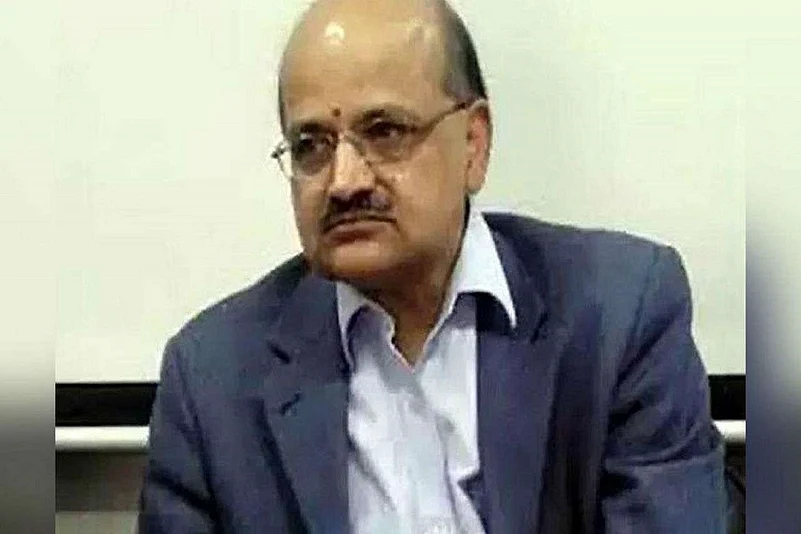The bureaucrat who oversaw Jammu and Kashmir’s tumultuous and controversial transition into two Union Territories has been shunted out as the chief secretary after nearly three years, and the political opposition lost no time in dismissing him as “the darkest person in the darkest hours of Kashmir”.
B.V.R. Subrahmanyam was replaced as the chief secretary of Jammu and Kashmir by Arun Kumar Mehta, who was posted as the financial commissioner.
“Will be remembered as the darkest person in the darkest hours of Kashmir. A person consumed by the self and also consumed by hatred for the Kashmiris. Saw expression of naked hatred for Kashmiris and belittlement of Kashmiris as a means of upward mobility for his self (sic),” People’s Conference chairperson Sajad Gani Lone tweeted.
The antagonism of Kashmiri politician towards Subrahmanyam is not difficult to understand. He was appointed as the chief secretary of Jammu and Kashmir in June 2018, just before the Centre placed the state under governor’s rule. This followed shortly after the PDP-BJP alliance government led by Mehbooba Mufti fell. A year later, Jammu and Kashmir was stripped of its special status with the abrogation of Article 370 and 35A.
Political commentators here describe him as unimpressive as an administrator. Given that he had unprecedented powers, they say, he actually didn’t bring any reforms except implementation of the plan of “erasure” of the state of Jammu and Kashmir, its symbols, and identity milestones.
Some officials describe the ‘Back to Village’ programme as his brainchild and call it a great success. Ahead of the abrogation of Article 370, Subrahmanyam started the rural outreach programme which saw designated officers reaching out to people to assess their development needs, inform them about welfare schemes and take their feedback for socio-economic transformation of rural areas. The programme was not pursued after J&K ceased to be a state.
Ahead of abrogation of Article 370, he chaired a meeting with officials of the Kashmir Gulf Club (KGC) at the civil secretariat. Subrahmanyam had started the meeting with polemics, saying there was a huge difference between the rich and the poor in the Valley and mentioned big houses along the airport road constructed over the years to draw his point that the rich are becoming richer in the state and the poor have no avenues. He even stated that he has never played golf in his lifetime.
During the meeting, he decided to throw open Kashmir Golf Club, spread over 52 acres, for the public to play golf at a nominal membership fee of Rs 100. The order was seen by many people as the “right step” against the elites after the government's “anti-corruption drive”. Even as the people were discussing golf, the government issued a series of orders, including asking all outsiders to leave Jammu and Kashmir.
Amid a military siege, communication blockade, and arrests of thousands of people including three former chief ministers, Article 370 was abrogated on August 5, 2019. He didn’t talk about golf any further.
Former Governor Satya Pal Malik in a speech in March 2020 in Goa, said a day before Article 370 was abrogated, he got a call from Subrahmanyam whom he quoted as saying that more than 1,000 people might get killed once the state was stripped of its special status. “I was told 1,000 people will get killed (after abrogation of Article 370). When I asked why, I was told that in Kashmir 10 people were killed during Farooq Abdullah’s election, 120 people were killed after (militant) Burhan Wani’s death. People will attack Raj Bhavan,” Malik said.
After abrogation of Article 370, Subrahmanyam had proudly said that “not a single soul cried” over the detention of mainstream political leaders. “Jammu and Kashmir was a broken state and there was no system in place due to years of misgovernance, corruption and unbelievable levels of fraud committed by leaders of mainstream parties and separatist organisations. There, not a single soul cried over the detention of political and separatist leaders in August last year,” he had said. However, the government hasn’t charged any mainstream leader, and most of them were detained for political beliefs, and have been now released.
Early this month Lieutenant Governor Manoj Sinha reached out to National Conference president Farooq Abdullah, J-K Congress president G.A. Mir, Congress leader Saifudin Soz, J-K Peoples’ Conference president Sajad Lone, to seek their suggestions to fight the COVID-19 pandemic. All these leaders were in detention post-August 5, 2019.
People’s Conference chairperson Sajad Gani Lone minced no words as he accused Subrahmanyam of trespassing “into a domain which belonged to the political class” and “made statements which were unambiguously political in nature”.
“Actually had delusions of Godliness. Thought of himself as God. Dropped big names. Boasted of having kicked out gubernatorial entities,” Lone said in a series of tweets.
Naseer Ganai in Srinagar
















